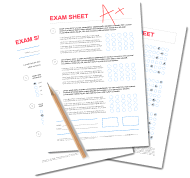This blog comes in handy for IELTS aspirants. Here, they will find the most effective tips to prepare for the IELTS exam, ensuring the students do not struggle much to score a good band score.

Table of Contents
Studying in a foreign country is a decision of brave hearts, as leaving the homeland and settling abroad needs courage. Although this will ensure a bright future, for that, you have to overcome numerous hurdles. Thus, one such hurdle is getting a good band score in IELTS, an English proficiency test required for non-native speakers. Passing this will only ensure you get the chance to pursue your higher studies in English-speaking countries. Thus, in this blog, you will explore the most effective tips to prepare for IELTS. But, before knowing the tricks, let's first have a brief insight into the different sections of the test.
IELTS stands for International English Language Testing System, which is one of the most popular tests for non-native speakers of English. This exam is a must for anyone applying to an English-speaking country for higher studies. This exam will examine an aspirant on the four bases:
| Sections & Time-Limit | No. & Type of Questions |
|---|---|
| Listening: 30 minutes | 40 Questions: Multiple choice, diagram labeling, sentence, and summary completion |
| Reading: 60 minutes | 40 Questions: Multiple choice, matching features & heading, sentence & summary completion |
| Writing: 60 minutes | More than 400 words: Task1: reports/letters, Task2: essays |
| Speaking: 11-14 minutes | Face-to-face interview: Introduction, general discussion, topics & follow-up questions |
A candidate has to appear for the three sections of the exam- reading, writing, and listening- on the same day without any gap. Moreover, they will get a leeway for the speaking section. Now, let’s dive into the score criteria for the test that will help you know how to start preparing for IELTS.
The listening and reading sections have the same parameters of 40 questions each. All the questions have one mark for a correct answer and no negative mark. However, you must score good out of 40 to get a good band score. For instance, if you score a 30, you will get a 7 band score, and there will be 8 for 35 marks, so must prepare for IELTS accordingly.
For the speaking section, you will be marked on fluency and coherence, Lexical Resource or vocabulary, grammatical range and accuracy, and pronunciation.
For the writing section, you will be evaluated on the basis of task achievement, coherence and cohesion, lexical resource, grammatical range, and accuracy.
These are the parameters on the basis of which, you will get a good band score for your IELTS exam. Moving ahead with the IELTS tips to overcome the challenges of each section to score a good band score. So, let’s begin with the writing section.
| Band Score | Skill Level |
|---|---|
| 9 | Expert |
| 8 | Very Good |
| 7 | Good |
| 6 | Competent |
| 5 | Modest |
| 4 | Limited |
| 3 | Extremely Limited |
| 2 | Intermittent |
| 1 | Non-User |
| 0 | Did Not Attempt |
In this section of the IELTS test, candidates are tested for their writing skills. Moreover, this part works with the basic mantra of keeping it simple and accurate. For this section, you must begin your preparation for the IELTS exam on these parameters:
We have listed some IELTS preparation tips listed by the experts to help you score well. So, explore the tricks to complete this section skilfully:
This section of the blog must have answered your question about how to prepare for the IELTS writing section. So, it is time to move ahead and explore the tips for another section of the exam.
Listening is another section of the IELTS test, where you are judged on the basis of your listening ability and comprehension of the language. For this section, you will get 40 questions to solve, each with one mark, so consider thin while you prepare for IELTS. For every correct answer, you will get one mark, and there will be no negative marking.
This section can be made easy with the tips listed below by the experts. Read ahead to uncover the tricks for how to do IELTS preparation:
These are the tips that can be useful while preparing for the listening section of the exam. Moving ahead with the next section and perceive how to start preparing for IELTS speaking test.
Speaking is one of the four sections of the IELTS for beginners, where you have to showcase your skills to speak fluently and make sense. In this part, you will be in an interview setup where you must speak and convince the interviewer. For this section, you will be evaluated on these parameters:
Read ahead to learn how to prepare for the IELTS speaking section:
These are some tips to answer your query about how to study for the IELTS speaking section in an ideal manner. Move ahead with the last section of the test and explore the tricks to ace this as well.
It is the reading section of the test, where you will be evaluated on the basis of how you read something to comprehend the information. In this section, you must prepare for IELTS according to the 40 questions to solve, each with 1 mark. For every correct answer, you will get one mark, and there will be no negative marking.
Here are the tips for how to do IELTS reading effectively:
Lastly, we hope that you have an idea about how to prepare for IELTS after reading the blog. These tactics will not only help you handle the test effectively but will also improve your way of looking at several things. Moreover, you must not forget that practicing something numerous times will build perfection. Thus, the more you repeat the steps and tips, the more closer you will be to your dream. So, implement all these tips and embrace the opportunity of scoring a band score of 8 on the IELTS test. All the best for your journey ahead.
Preparing for such a competitive exam requires time, so one week is inappropriate. Thus, start early to ensure you are well-prepared on the test day.
Yes, as per the new update in the IELTS guidelines, you can retake any particular section of the test.
Yes, it is possible to score a band score of 8 in IELTS, but it requires a lot of hard work and dedication.
According to the British Council, a band score of 9 means you are an expert, 0 is for non-users, and so on. Generally, a band score between 6 and 9 is considered good.
Gladly, there is no time limit to retake the test. Thus, you can appear for the exam as many times as you want and get the preferred band score.

We are available in :
BangaloreAhmedabadJaipurHyderabadKeralaPuneChandigarhMumbaiGurgaonChennaiKolkataTrivandrumNoidaKochiCalicutKottayamKollamThrissurIndoreUdaipurdisclaimer:logos and other registered trademarks of universities used on this platform are held by their respective owners. Gradding does not claim ownership or association on them, and their use is purely for informational and illustrative purposes.
 Take Writing Mock Test Now!
Take Writing Mock Test Now! 
